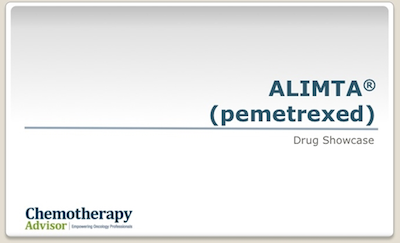Pemetrexed – Oncology Drug Information
Alimta is a novel antifolate compound with inhibitory activity against a number of enzymes including thymidilate synthase, dihydrofolate reductase and glycinamide ribonucleotide formyl transferase. Alimta has been studied with cis-platinum (Cisplatin) or gemcitabine (Gemzarâ) in the treatment of non-small-cell lung cancer (NSCLC). Phase II studies also include pemetrexed in colorectal cancer, pancreatic, breast, and other cancers. Mesothelioma (MPM), a rare cancer in which malignant cells are found in the pleura, peritoneum or pericardium, is associated with a history of asbestos exposure in 70 – 80 percent of cases. There is no chemotherapy regimen that has shown effectiveness in the treatment of MPM. In May 2002 a study was presented that showed a combination of Alimta and cisplatin was efficacious in tumor reduction and enabled patients with MSM to live longer. The FDA approved pemetrexed on February 4, 2004 in combination with cisplatin for the treatment of malignant pleural mesothelioma in patients whose disease is unresectable or for patients who are not otherwise candidates for curative surgery.
Kinetics:
Alimta exhibits two-compartment pharmacokinetics. Distribution T½ is 0.63 hours while terminal T½ is 2.73 hours. The mean T½ is approximately 3 hours. Elimination is primarily in urine as unchanged drug (70-90% of dose). Drug clearance is reduced in patients with decreased renal function and patients with folate deficiency. Clearance of pemetrexed is decreased when Cr Cl is less than 90 ml/min. As compared with patients that had a creatinine clearance (CrCl) of 100 ml/min, the systemic exposure of Alimta increased by 13%, 54%, and 65% for patients with a CrCl of 80 ml/minute, 50 ml/minute, and 45 ml/minute, respectively.
Indication:
Alimta is FDA approved for the treatment of malignant pleural mesothelioma that is either unresectable or is unable to be removed surgically due to patient factors. Alimta is being studied in a variety of other cancers.
Dose:
Pemetrexed is dosed at 500 mg/m2 IV over 10 minutes plus cisplatin (75 mg/m2 IV over 2 hours beginning approximately 30 minutes after the end of the pemetrexed infusion) on day 1 of a 21-day cycle. Pemetrexed has been dosed at 500 – 600 mgm2, usually with Cisplatin 75-100 mg/m2 every 3 weeks in a variety of other cancers. Pemetrexed has been used as monotherapy in some studies.
Adverse Reactions:
Adverse reactions in early studies were attributed to low levels of folic acid and Vitamin B12 as measured by elevated levels of homocysteine. Neutropenia, thrombocytopenia, and increased liver enzymes (AST & ALT) are common. Bone marrow suppression is the dose-limiting toxicity of pemetrexed. An erythematous rash may occur (typically on face and trunk) and may be painful. Gastrointestinal adverse reactions include nausea/vomiting (79—84%), and constipation (39—44%).
Contraindications:
Hypersensitivity to pemetrexed or any components in the product. Pemetrexed should not be used in patients with renal failure or moderate to severe renal impairment. Not recommended in patients with a creatinine clearance (CrCl) < 45 ml/minute.
Precautions:
Vitamin supplementation, consisting of folic acid orally and vitamin B12 parenterally, is recommended prior to and throughout the course of therapy. Folic acid has been dosed at 350 – 1000 mcg orally daily or 5mg daily from days –2 through +2. Vitamin B12 has been dosed at 1000 mcg IM every 9 weeks in studies. Vitamin supplementation has shown to greatly decrease the incidence of grade 3 & 4 toxicities (hematologic and non-hematologic). To reduce cutaneous reactions, give dexamethasone 4 mg PO BID for 3 days beginning the day before administration of pemetrexed.
Monitoring Parameters:
Monitor CBC with differential, LFT’s and bilirubin, BUN & Scr. Myelosupression is frequent and correlates with renal function. Grade 3 or 4 neutropenia has occurred in up to 75% of patients. Renal function needs to be determined before each Alimta infusion. Monitor patient for development of rash.
AvaIlability:
Pemetrexed is available in 500mg vials (AWP $2,537.50). Store unopened single-use vials at room temperature 15o-30o C (59o-86o F). Add 20 ml of preservative free normal saline to reconstitute each drug vial. Do not use other diluents. Gently swirl the vial to get all of the powder into solution, which has a concentration of 25 mg/ml. Withdraw the needed amount of solution and add to 100 ml of 0.9% sodium chloride. The reconstituted drug and the further diluted infusion solution are physically and chemically stable for up to 24 hours after initial reconstitution when stored between 2o-8o C (36o-46o F) or at 25o C (77o F). Infuse the diluted pemetrexed infusion over 10 minutes. Pemetrexed is physically incompatible with diluents containing calcium, Lactated Ringer’s injection, USP and Ringer’s injection, USP.

No Comments